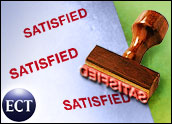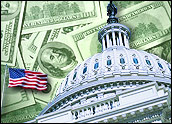
The U.S. government is getting better at designing Web sites that are user-friendly and provide value, according to the latest E-Government Satisfaction Index, part of the larger American Customer Satisfaction Index released by the University of Michigan and ForeSee Results.
Satisfaction with federal Web sites improved 1.4 percent to 73.9 on ACSI’s 100-point scale — one of the highest scores in this category thus far, according to the report.
Over the last two years, constituent satisfaction with government’s online endeavors bounced around, Larry Freed, president and CEO of ForeSee Results, told CRM Buyer, dropping to a low of 69 in Q4 2003. The e-government category has never attained the 80 mark, he said, which would put it on par with private sector e-commerce satisfaction.
Right Track
Still, it is clear that the government is steadily improving. For instance, the number of individual government sites that have topped 80 — as opposed to the aggregate figure for the category — is steadily rising, Freed said.
Twenty-five percent of sites achieved a score of 80 or higher in the latest survey, compared to 21 percent in the previous survey.
“Compared to the private sector, the government still trails significantly in satisfaction,” Freed concluded, “but we have seen two quarters in which satisfaction in the category has risen, so that shows they are on the right track.”
By feature, constituents were satisfied with 96 percent of e-government sites for their search functionality; 57 percent for their overall functionality; and 37 percent for their navigation.
The study also measured satisfaction by functional category. E-commerce/transactional sites rose by 1.6 percent to 78.2; career/recruitment sites rose by 0.9 percent to 77.3; department/main sites dropped by 0.5 percent to 73.3; and news/information sites increased by 1.1 percent to 73.3.
The Obama Factor?
This upward trend will likely continue, Freed said, if for no other reason than current budgetary constraints. With the U.S. government now committed to a US$700 billion financial rescue plan, money will be tight in all other categories. “E-government can deliver a huge payback because it is so much more efficient,” he observed.
Government officials will also likely strengthen their focus on e-government under an Obama Administration, assuming of course, that he wins the election next week, said David Johnson, principal with the Strategic Vision political consulting firm.
“One of the reasons for Obama’s success thus far has clearly been his strategic use of the Internet in reaching out to voters,” he told CRM Buyer. “Politicians in both parties have paid attention.”
This lesson is likely to be reflected in everyday government operations — not just the next election cycle — Johnson expects.
“This is not just about campaigning, but about getting a message across to constituents once you are in office,” he said. “Even if Obama loses, I think you will start to see those politicians who once scorned the Web as a viable communication tool embrace these concepts.”
For instance, there have been studies that found senior citizens — particularly women — would rather go online to read literature from their elected officials than receive their messages in the mail, he said.
Local Efforts
There are also signs that states and local governments are following suit with improvements to their sites. For example, the city of Virginia Beach, Va., recently pointed to improvements it made on its official Web site, including the addition of “action driven sections” such as “Apply for,” “How do I,” “Pay my,” and “Report a,” which allow users to quickly and easily conduct business, interact with city government, and set up RSS (really simple syndication) feeds for Virginia Beach hot topics, news and events.
Like their federal counterparts, though, states have plenty of room for improvement. A recent study by the Pew Center on the States, “Being Online is Not Enough: State Election Web Sites,” concluded that many state election Web sites are too difficult for voters to find and use.
For state and local officials looking for guidance on what makes a good site, ASCI lists the best and worst federal government sites, according to survey rankings:
The Top Performers:
- Social Security Administration Retirement Planner, with a score of 90;
- Social Security Administration Help with Medicare Prescription Drug Plan Costs — 88;
- Social Security Administration Benefits Application — 87;
- National Library of Medicine, National Institutes of Health MedlinePlus — 86; and
- Department of Defense America Supports You — 85.
The Bottom Performers:
- Department of Defense Military Health System Defense TRICARE — 62;
- National Archives and Records Administration Access to Archival Databases — 62;
- General Services Administration E-Library — 60;
- Federal Emergency Management Agency, Homeland Security National Flood Insurance Program — 56; and
- Federal Emergency Management Agency, Homeland Security FEMA Map Service Center — 53.












































